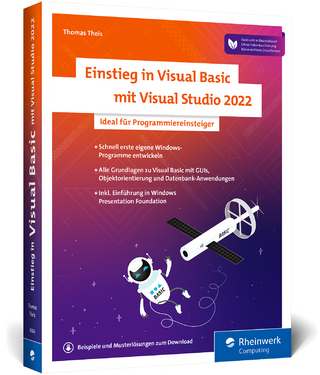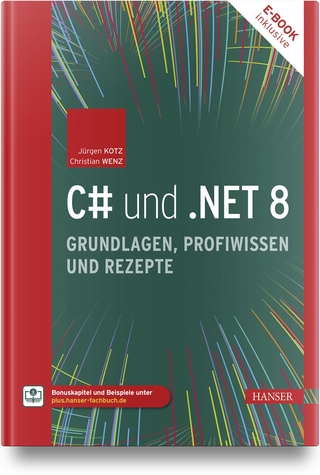
WAGNER
Addison-Wesley Educational Publishers Inc (Verlag)
978-0-321-65870-8 (ISBN)
- Titel erscheint in neuer Auflage
- Artikel merken
Effective C#, Second Edition, follows a clear format that makes it indispensable to hundreds of thousands of developers: clear, practical explanations, expert tips, and plenty of realistic code examples. Drawing on his unsurpassed C# experience, Wagner addresses everything from types to resource management to dynamic typing to multicore support in the C# language and the .NET framework. Along the way, he shows how to avoid common pitfalls in the C# language and the .NET environment. You’ll learn how to
Use both types of C# constants for efficiency and maintainability (see Item 2)
Employ immutable data types to promote multicore processing (see Item 20)
Minimize garbage collection, boxing, and unboxing (see Items 16 and 45)
Take full advantage of interfaces and delegates (see Items 22 though 25)
Make the most of the parallel framework (see Items 35 through 37)
Use duck typing in C# (see Item 38)
Spot the advantages of the dynamic and Expression types over reflection (see Items 42 and 43)
Assess why query expressions are better than loops (see Item 8)
Understand how generic covariance and contravariance affect your designs (see Item 29)
See how optional parameters can minimize the number of method overloads (see Item 10)
You’re already a successful C# programmer–this book will help you become an outstanding one.
With more than twenty years of experience, Bill Wagner, SRT Solutions cofounder, is a recognized expert in software design and engineering, specializing in C#, .NET, and the Azure platform. He serves as Michigan’s Regional Director for Microsoft and is a multiyear winner of Microsoft’s MVP award. An internationally recognized writer, Bill is the author of the first edition of this book and More Effective C# (Addison-Wesley, 2009) and currently writes a column on the Microsoft C# Developer Center. Bill earned a B.S. in computer science from the University of Illinois at Champaign-Urbana.
Introduction xiii
Chapter 1: C# Language Idioms 1
Item 1: Use Properties Instead of Accessible Data Members 1
Item 2: Prefer readonly to const 8
Item 3: Prefer the is or as Operators to Casts 12
Item 4: Use Conditional Attributes Instead of #if 20
Item 5: Always Provide ToString() 28
Item 6: Understand the Relationships Among the Many Different Concepts of Equality 36
Item 7: Understand the Pitfalls of GetHashCode() 44
Item 8: Prefer Query Syntax to Loops 51
Item 9: Avoid Conversion Operators in Your APIs 56
Item 10: Use Optional Parameters to Minimize Method Overloads 60
Item 11: Understand the Attraction of Small Functions 64
Chapter 2: .NET Resource Management 69
Item 12: Prefer Member Initializers to Assignment Statements 74
Item 13: Use Proper Initialization for Static Class Members 77
Item 14: Minimize Duplicate Initialization Logic 79
Item 15: Utilize using and try/finally for Resource Cleanup 87
Item 16: Avoid Creating Unnecessary Objects 94
Item 17: Implement the Standard Dispose Pattern 98
Item 18: Distinguish Between Value Types and Reference Types 104
Item 19: Ensure That 0 Is a Valid State for Value Types 110
Item 20: Prefer Immutable Atomic Value Types 114
Chapter 3: Expressing Designs in C# 125
Item 21: Limit Visibility of Your Types 126
Item 22: Prefer Defining and Implementing Interfaces to Inheritance 129
Item 23: Understand How Interface Methods Differ from Virtual Methods 139
Item 24: Express Callbacks with Delegates 143
Item 25: Implement the Event Pattern for Notifications 146
Item 26: Avoid Returning References to Internal Class Objects 154
Item 27: Prefer Making Your Types Serializable 157
Item 28: Create Large-Grain Internet Service APIs 166
Item 29: Support Generic Covariance and Contravariance 171
Chapter 4: Working with the Framework 179
Item 30: Prefer Overrides to Event Handlers 179
Item 31: Implement Ordering Relations with IComparable and IComparer 183
Item 32: Avoid ICloneable 190
Item 33: Use the new Modifier Only to React to Base Class Updates 194
Item 34: Avoid Overloading Methods Defined in Base Classes 198
Item 35: Learn How PLINQ Implements Parallel Algorithms 203
Item 36: Understand How to Use PLINQ for I/O Bound Operations 215
Item 37: Construct Parallel Algorithms with Exceptions in Mind 220
Chapter 5: Dynamic Programming in C# 227
Item 38: Understand the Pros and Cons of Dynamic 227
Item 39: Use Dynamic to Leverage the Runtime Type of Generic Type Parameters 236
Item 40: Use Dynamic for Parameters That Receive Anonymous Types 239
Item 41: Use DynamicObject or IDynamicMetaObjectProvider for Data-Driven Dynamic Types 243
Item 42: Understand How to Make Use of the Expression API 254
Item 43: Use Expressions to Transform Late Binding into Early Binding 261
Item 44: Minimize Dynamic Objects in Public APIs 267
Chapter 6: Miscellaneous 275
Item 45: Minimize Boxing and Unboxing 275
Item 46: Create Complete Application-Specific Exception Classes 279
Item 47: Prefer the Strong Exception Guarantee 284
Item 48: Prefer Safe Code 294
Item 49: Prefer CLS-Compliant Assemblies 298
Item 50: Prefer Smaller, Cohesive Assemblies 303
Index 309
| Erscheint lt. Verlag | 18.3.2010 |
|---|---|
| Verlagsort | New Jersey |
| Sprache | englisch |
| Maße | 180 x 231 mm |
| Gewicht | 548 g |
| Themenwelt | Informatik ► Programmiersprachen / -werkzeuge ► NET Programmierung |
| Informatik ► Software Entwicklung ► Objektorientierung | |
| ISBN-10 | 0-321-65870-1 / 0321658701 |
| ISBN-13 | 978-0-321-65870-8 / 9780321658708 |
| Zustand | Neuware |
| Haben Sie eine Frage zum Produkt? |
aus dem Bereich



